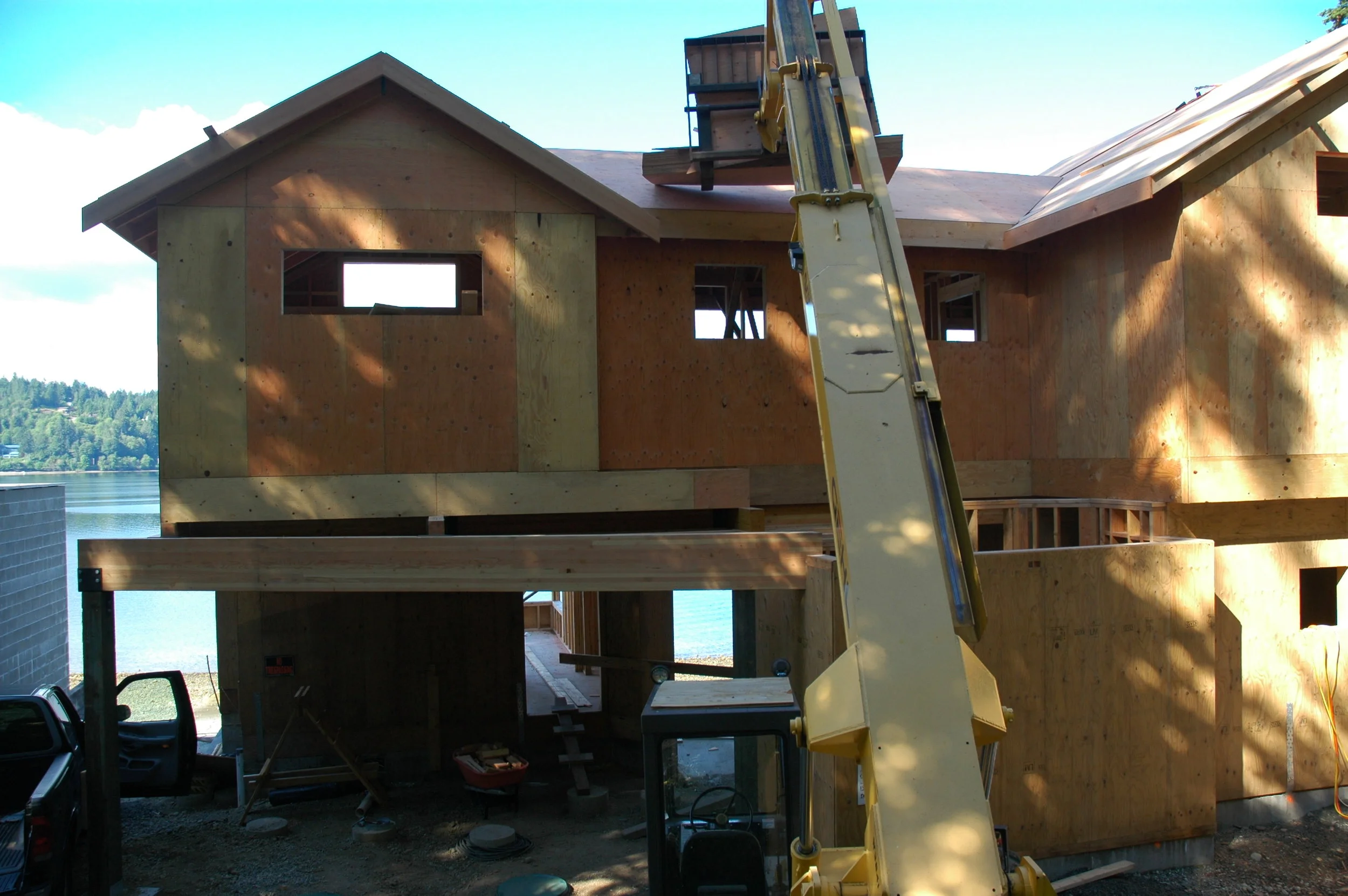Working Land Deals With Builders
Working Land Deals With Home Builders:
I spent decades in the Pacific Northwest as a private land developer, selling the finished lots to either builders or private parties. After I moved to the Southeast I temporarily worked with a large National Builder developing residential lots on a huge scale. Having lived in both worlds I think it is useful to look at the mentality and motivating factors of builders as both allies and as worthy competitors of the private land guy.
A look at National Builders:
National Builders measure their standing against one another by unit sales volume - the number of homes sold, closed and funded in a given year. Some are public companies listed in the equity markets and some are still privately owned. Volume by unit is a key metric and squeaking the last cent out of a sale is not always the primary goal. Like car dealers, you can get good deals as a buyer that are contracted to close by the end of a given month. This is especially true at the end of the fiscal year provided the sale can be closed and funded.
My experience in working for a National Builder to develop land was short and intense. My role was to take on 13 separate phased projects, all well over 1,000 acres each. My biggest project was Phase II and III of a 5,300 acre community, soon to be over 8,000 acres from assemblage. I actually hated the job and left as soon as I felt the time was right and my obligations were fulfilled. The pace was too erratic and I knew that important things were being missed or ignored for the sake of speed.
Opportunity for Private Land Developers:
The private guy can associate with national or large builder/developers in some of the following ways.
Selling the project at Preliminary Plat Approval:
Here the private guy may find that he is over budget and will be short on money for pushing the plat through to final approval. Or, his construction cost analysis is higher than projected and the project is sure to be over budget. Another opportunity is when market prices are flat, dropping, or just too low for the project to pencil out in top line sales. All of these examples might point to bad planning or poor execution, but on the other hand stuff does happen and it’s good to have a bail out option if you are a land developer.
If selling at Preliminary Plat Approval is considered, the private land developer should be careful to get every possible dime from the sale. Builders, big or small, are going to low-ball the project for any offer put forward, so a cost-to-completion analysis should be a on-hand during negotiations for the benefit of the seller (you). Large builders, or any builder for that matter, are good at placing survival clauses in contracts where the seller has remaining obligations after closing. I would avoid that if possible, and if that guy happens to be you I would make sure to understand exactly what those obligations are, being certain that they can be fulfilled.
Selling at Final Plat Approval:
I am a pure dirt guy and selling after final plat approval is what I have always done as a private developer; having never built homes in any of my projects. The key consideration is the span of time to sell the project out. Most profit is usually made on the final lots sold in a project, earlier sales being the recapturing of cost basis, so a guy has to figure out if it is better to dump the lots in chunks to a builder for less money or eek out every dime by selling individually to private parties.
My recipe for making this decision is pretty simple provided I am on track to my cost projections. If I have lots better suited to entry level homes or step up homes, I’ll typically sell to builders. If they are lots with a lot of extra amenities and can command premium prices, I usually sell them individually. Of course no single answer is correct every time but what is most profitable measured against elapsed time is my usual course of action.
My experience in working with builders:
I have built 3 homes for myself using custom builders and I hated every single second of it. I have sold vacant lots to dozens and dozens of builders and I can’t say I enjoyed that either (even though they were my customers and I probably should have). Having said that, I have respected all of them for the quality of their finished product. I never had a home built for myself that I wasn’t fully satisfied with and I cannot point to any land development project that a builder screwed up for me by building sub-standard homes. They can also help in getting momentum going in a project. It’s always nice for prospective buyers to see 5 or 10 new homes going up in a new project, since it portrays visible cues that the project is solid.
Positive builder observations:
Builders that survive are magicians at coordinating multiple activities that never come down when or how they should. They have to manage flakey subs and some of the best ones are the flakiest. Scheduling of material deliveries, code compliance, OSHA, handling errors on plans, dealing with inspectors, dealing with stupid people they are working for, bad weather….you name it and I could go on and on. I could never do that job since I am way to linear, so my hat is off to the guy that can and by the way, thank you for my beautiful homes! That’s my salute to all general contractors and all the others that have survived and thrived. It takes skill and balls to do it and you have to be really good at a lot of things that all come down at once.
Now the cautionary part:
If there is a phrase that describes almost every interaction with a builder it’s this: “No problem”. I can’t say I blame them for saying it, because if any person hiring them knew what they were about to go through they would never do it. “No problem” is used for everything, whether it’s with people who have been in real estate forever, or folks building their very first home. It gets in the way however, especially when you are talking about a certain thing called reality and that’s what we talk about here. The reality is that there are usually a lot of problems that are sure to come up. A lot of time it’s not the builders fault, stuff just comes up as a natural fallout.
Here’s some things to watch:
Contracts:
Maybe it’s the builders I have worked with, but some of the worst contracts I have seen are from builders. At times, they are vague, sloppy, incomplete, contradictory, lack measured accountability, and at times sly.
Read my post on Contracts about the builder who had his agent write a Purchase Agreement dated to close the following month. It looked pretty good until I saw that it was the following month of the next year. If I had signed it, the lots would have been a pending sale to finally close in 13 months. In fairness though, I have worked many contracts with builders that were spot-on, but be careful to insist on specific, complete and thorough agreements. A good real estate lawyer is a great idea, or an experienced land agent.
Extended time lines:
I freely throw myself in with this crowd since I am guilty of time overruns in my projects. Unexpected stuff in real estate just happens and when it does it always takes a lot of time to deal with. In contracting with anyone, including builders, I put in accountability measures.
For instance, if I am contracting as follows with Joe Blow Builder to buy 10 lots from me on a take-down schedule:
“…. the Buyer will close lots 1-5, inclusive, within 14 days, or sooner, of mutual execution of this Agreement. Lots 6-10, inclusive, will be closed 60 days, or sooner, from the closing date of lots 1-5”.
This is a decent start, but if Joe Blow is off to a slower start with Lots 1-5 after he closes on them, he may ask me for an extension for the closing of Lots 6-10. Here’s how to deal with it before he asks:
“If Buyer fails to close Lots 6-10 by the agreed upon closing date, an extension of 30 days to close is granted from Seller to Buyer for Lots 6-10, inclusive. If the extension is exercised by written notice from Buyer to Seller, the purchase price for Lots 6-10, inclusive, shall be increased by $5,000.00 (five thousand & 00/100 dollars), at closing, for each Lot extended”.
This is an example of good contracting. The intentions of the parties and the specific terms are identified AND provisions are made for who is responsible and for how much if the final take-down does not occur on the scheduled timeline. This also provides the buyer with serious motivation to follow the agreed upon take down.
Wrap-up:
I take my hat off to builders large and small that survive and thrive. A wise land developer will work to establish these important relationships, while taking great caution in the handling of business affairs with them. I cannot hold any builder responsible for taking every step possible to gain an advantage as long as it is legal and ethical. If a private developer gets stung by a wise old guy who knows how to work the deal in a way that changes things to his advantage, don’t blame him. Learn from mistakes and adjust while being particularly careful to contract wisely. For more, see Real Estate Contract Basics: https://www.landdevelopmentrealities.com/home/2018/12/8/real-estate-contracts-1 .






